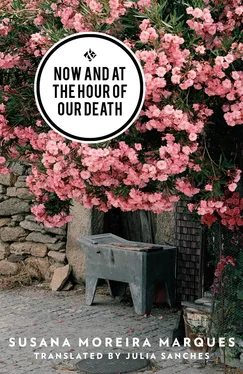HIM [watching night fall]: The moon’s just the same in Angola.
HER: And the stars. Sometimes I was there and it was like I was still here, just looking up.
Sometimes I imagine Elisa painting. She has long black hair and narrow shoulders; her back is to me and it’s as if she herself were part of the picture, and as though the portrait she is painting, the painting within the painting, were unfinished, still in the process of creating itself.
The truth is Elisa hasn’t painted in years, though a part of her still creates images — she can’t live otherwise — and maybe that’s why I picture her painting, hoping that perhaps, after her father’s death, she has taken it up again. Those who don’t have faith find comfort in ideas beyond heaven, and Elisa believes fervently in humanity’s capacity to create.
Or maybe I always picture her within a painting because, be it in Trás-os-Montes, where her parents chose to move when she was still young, or in Porto, where she was born and where she later returned, she never seemed to belong anywhere I saw her. After living a while in the small town of Mogadouro, her parents decided to move somewhere even smaller. And so they bought a house in a village: a house her father had single-handedly renovated from top to bottom. It was in that house that I often spoke to Elisa. Later — her father had died by then — I met up with her in Porto, in the apartment she had just moved into with her boyfriend. The apartment was in a narrow building with steep stairs leading up to a top floor that felt claustrophobic rather than spacious. The building was located in the center of Porto, on a square with a forgotten air about it, like so many other squares and streets in the center of Portugal’s second most important city. I visited her on a public holiday and there were very few people out on the streets. A couple of kids played ball listlessly. Elisa was fixing up her apartment, trying to make it match her sensibility as closely as possible. Yet she already seemed to know that, despite all her effort, it still wouldn’t be the right setting for her. I pictured her leaving again and starting up somewhere new, in a big city perhaps, since she possessed the intensity of large metropolises. She reminded me of a character who had not yet found her story.
The first time I saw her she was at her father’s bedside. I was moved by the way she touched him, by the way she squeezed his hand. Every time she spoke, she would wait for an answer. She didn’t expect him to moan or sigh or to make any other strange new sound — the sounds of sickness — but instead expected to hear him as she hoped to later remember him.
Their youngest cat, Nicha, leapt onto the bed and tried to nestle in between her father’s legs. Elisa shooed her away affectionately. Her mother wandered around the room with a fly swatter and, whenever a fly landed on Elisa’s father, she killed it, not knowing if he could feel a thing.
In the room, there was an articulated bed for the patient and, beside it, the bed where his wife slept. Those were wearying nights, and recently his wife had been going to sleep convinced that was the night her husband would die. Then, after waking up and checking to see if he was breathing, she’d think of how he might not make it to the end of the day.
Lately, in the night and during the day, he’d been waking up from dreams or from hallucinations — it was hard to tell them apart — and speaking of Porto, his hometown. He’d ask when they were going to leave.
In the room, a television stood on a table, always on and always muted; next to it were family photos, and amongst them a photo of the couple standing against a Trás-os-Montes landscape. They are still young in the photograph, which could have been taken on one of their first trips to the region, when they fell in love with the land and made the decision to move there.
I never saw Elisa against a Trás-os-Montes landscape and I can’t picture her in the countryside. The truth is we never met outside and, because of her doll-white skin, I can’t help but picture her indoors. In the photos of her scattered around the house, the backdrops are impossible to make out. That close-up of her that hangs in the kitchen, from when she was very young, back when she was a goth — short spiked hair, collar around her neck, heavy eye make-up — could have been taken in a studio.
That day and then a few days later, we talked at the kitchen table. Her mother was always nearby, sitting down and getting up again, wandering between the kitchen and the bedroom. Behind Elisa there was a door that led to the garage, which was her father’s workshop and where he had spent his stronger hours. Her father had not yet died, but it already felt haunted.
To Elisa’s left was the front door, which friends and neighbors would often knock on to ask after Senhor Rui. There was also a first-floor entrance, which led to stairs that flanked the outside of the house.
Elisa’s father was a contractor and known for being good at his job. He’d only hand clients the keys to their houses once he was certain there was nothing left to be done. The owner would walk in and find their home finished, perfect. Yet his own house never would be; he’d left things half-done, imperfect. That little window, to Elisa’s right, on the wall above the kitchen counter, was one of his last jobs. The hatch let light from the kitchen into the other ground-floor room. He didn’t know then that they would one day have to turn that room into a bedroom because he would no longer be able to walk up the stairs to his own bedroom on the upper floor.
Scene: mother and daughter at the kitchen table. Now and then, in the silence, when they stop speaking, they can hear him. (Or is it the sound of his illness?) The other daughter is missing.
Sara was on her way. She drove alone. And she cried the whole way from France to Portugal, the road distant, distorted, a desert.
Along the staircase hang pictures Elisa painted when she was younger and had not yet decided she would not be an artist, but a lawyer. One is a self-portrait of a woman with long black hair and large eyes. The background is once again abstract and, if I remember correctly, blue, a shade that might mean night or day.
We walked up to the first floor. It was Saturday night and Elisa had decided to throw a dinner party, to fill the house with people and noise: a regular occurrence on weekends. No one was allowed to be sad on her watch, not while her father was still alive. She also thought that perhaps her father could, if not hear, at least feel the party, and that he would like the idea that life was still going on around him. But it was the guests who could hear him from the floor below. The family called those sounds wind. ‘He’s howling,’ they’d say.
He was the main topic of conversation throughout most of the dinner. The guests painted a portrait of a charismatic man who hadn’t had an education, but who had learned all the same. A man who loved people, who would leave the house and not return until hours later, having stopped to speak to everyone he met. He had lived as few others had, with real resolve, and he would die in the same way. He didn’t want his doctors to fool him or lie to him, to omit or downplay the gravity of his illness. He knew exactly what was happening to him. He was dying.
At dinner, they ate seafood rice, consumed multiple bottles of vinho verde and made enough of a racket to scandalize the neighbors. At times, her mother would ask for some quiet and, even though she couldn’t tell whether her husband was calling her, she’d walk downstairs to comfort him, to reposition his legs, or simply to see him. No one knew whether, in those moments when he was more lucid, he could sense the more-or-less forced cheerfulness on the floor above him. But Elisa knew those moments of lucidity were the worst for him. One of the images she would never live to forget was this: the brief but eloquent look in her father’s eyes whenever he became aware of the situation he was in.
Читать дальше












